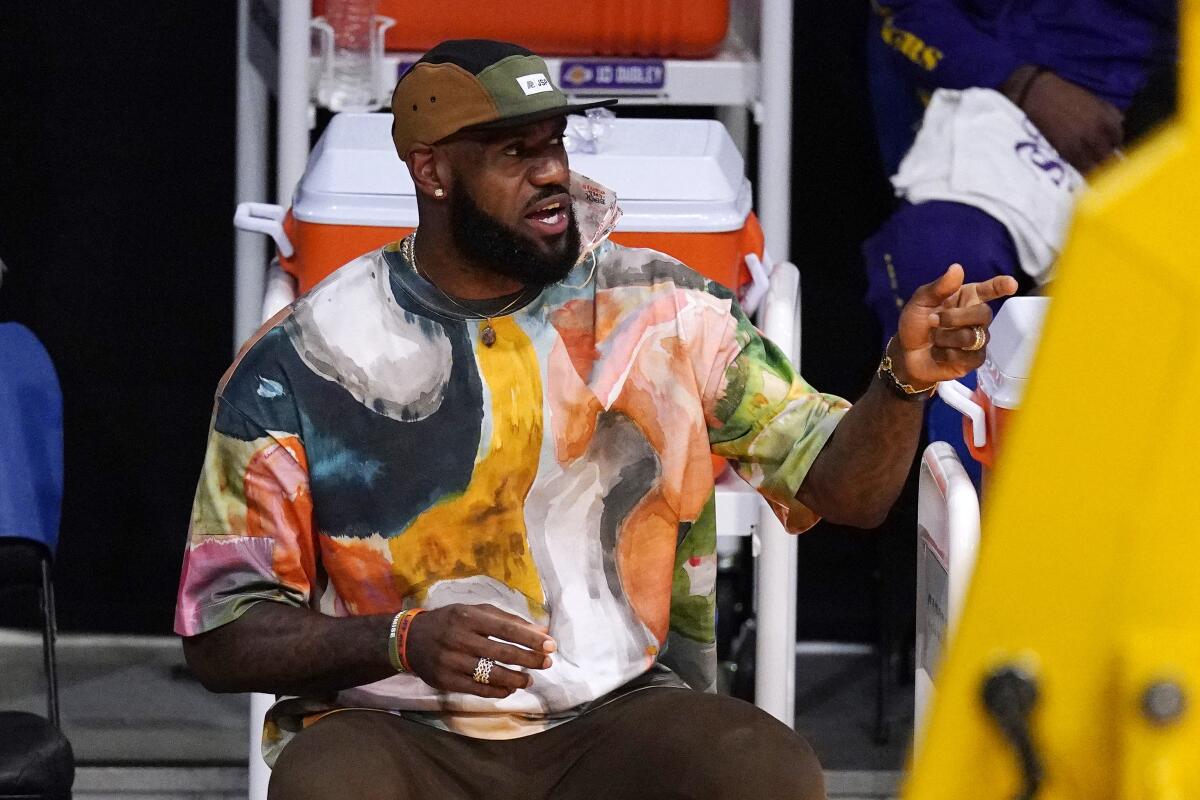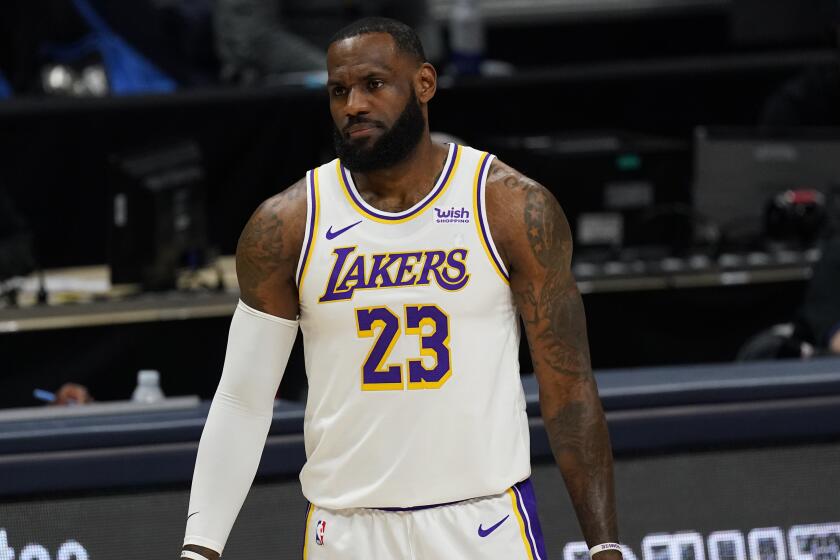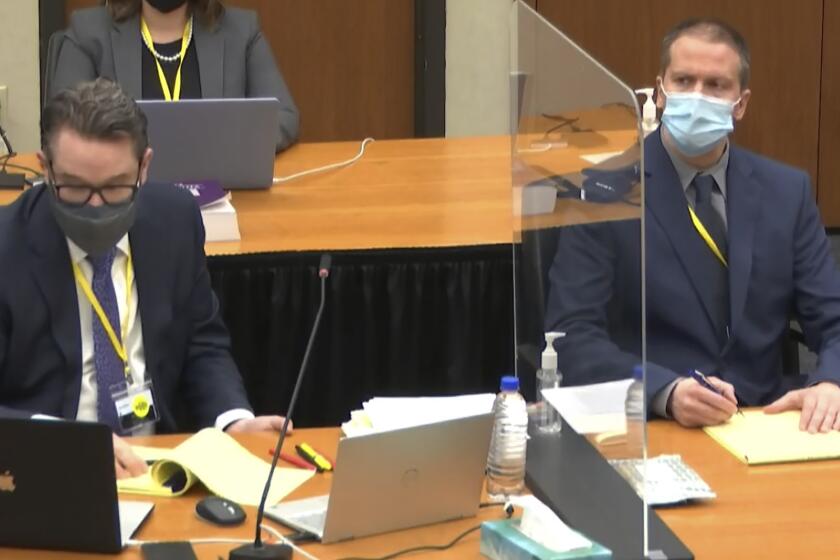Column: LeBron James tweeted poorly — and others saw an out from addressing the real issues

The season finale of Marvel’s “The Falcon and the Winter Soldier” was released Friday but I’m still processing a statement made in the previous episode: “They will never let a Black man be Captain America.”
I wonder if LeBron James has seen it yet.
For the record:
8:02 a.m. April 25, 2021An earlier version of this column stated Ken Williams was president of the White Sox in 2000. His title was general manager.
Last week the Kid From Akron found himself in the crosshairs of another stick-to-sports maelstrom for posting, then deleting, a tweet about the police shooting of a 16-year-old Black girl in Ohio. From sports debate show hosts to members of Congress, someone from every walk of life seemingly was asking, “Why?”
Why did he post it? Why did he delete it? Fox News did a story about how the other networks weren’t making a big enough deal about it. Opportunistic politicians — representing the proverbial “they” that won’t let a Black man be Captain America — piled on.
“Lebron James truly has a lot of nerve targeting a police officer for doing his job,” Rep. Lauren Boebert (R-Colo.) wrote on Twitter. “I’m not sure what China has on him, but his constant push for division in this country is obscene.”
Sen. Ted Cruz (R-Texas) said James’ tweet “could certainly be interpreted by some, even, as a call for violence,” a remark echoed on social media by Sen. Tom Cotton (R-Ark.), who posted, “this is disgraceful and dangerous. Is the NBA okay with this? Is Twitter?”
LeBron James deleted his tweet that read ‘YOU’RE NEXT #ACCOUNTABILITY’ with a photo of the officer who shot and killed 16-year-old Ma’Khia Bryant.
And so we found ourselves in the familiar space of debating more about how LeBron James said something than why he said it.
James’ back story — a literal rags to riches story — should make him the paragon of American exceptionalism embodied by Captain America. But his politics, specifically his tendency to speak out on issues that are important to the Black community, makes him more of a villain than a source of inspiration for conservatives prone to be more upset about tan suits than such hard questions as the atrophied relationship between law enforcement and communities of color.
The controversial, deleted tweet — in which James posted a picture of the white officer who shot and killed 16-year-old Ma’Khia Bryant along with the words “YOU’RE NEXT #ACCOUNTABILITY” — was inarguably premature. Body cam video appears to show Bryant attacking another teen with a knife seconds before the shots were fired; many consider the officer’s actions justified. Others are skeptical because of years of simmering tension that resulted in Columbus’ current search for a new police chief because, according to the city’s mayor, the previous one “could not successfully implement the reform and change I expect and that the community demands.”
Those details are germane to the larger issue of this country’s discomfort with Black leadership. And nowhere is that discomfort more evident than in the world of sports.
We’ve all followed so many Chauvin-like cases that it’s insulting to hear elected officials say, “we are better than this.” No, we are not.
Which brings me back to that line from “The Falcon and the Winter Soldier.”
It’s easy to assume “they will never let a Black man be Captain America” was written to reflect a post-George Floyd world, the dangers of “woke culture.” The reality is that subject was approached more than three decades ago: Captain America, Volume I, Issue No. 333. It hit stores in 1987.
Like the current streaming series, the question of “Who will be Captain America’s successor?” is an essential element of the storyline in the comic book. In Issue 333, a committee of military and government officials is debating who should represent American exceptionalism when a Mr. Mathers holds up a headshot.
“I imagine we could also rule out another of Rogers’ friends and ex-partners, Sam Wilson, alias the Falcon,” he starts. “I doubt the country is ready for a Black Captain America.”
The issue hit shelves a few months after longtime Dodgers executive Al Campanis went on ABC’s “Nightline” and infamously said, when asked about the lack of Blacks in leadership positions in baseball, “No, I don’t believe it’s prejudice. I truly believe that they may not have some of the necessities to be, let’s say, a field manager, or perhaps a general manager.”
Roger Kahn tells the story of how upset Jackie Robinson was when Paul Robeson, opera singer, actor and advocate of the communistic way of life, made a statement that no blacks would fight in a war against the Soviet Union because they have nothing to win in fighting for a racist United States.
The interview ignited a firestorm, and Campanis was fired less than 48 hours later. But here’s the rub: When Ken Williams was hired 13 years later as GM — the third Black GM in MLB history — , he said “no n— should run the Chicago WHITE Sox” was painted on the side of his house. More than 20 years later, Derek Jeter is baseball’s only Black CEO.
So, did Campanis get canned for the substance of his remarks or for the act of giving voice to them?
It’s not just baseball. In the Institute for Diversity and Ethics in Sport 2020 report, of the 130 athletic director positions at FBS, white men accounted for nearly 77%; nearly 70% of conference commissioners were white men; roughly 84% of football head coaches were white men, who also make up about 59% of assistant coaches as well. Meanwhile the number of football student athletes who were white was less than 35%.
The NFL’s Rooney Rule was enacted in 2003 to compel owners to interview candidates of color for head coaching jobs. How’s that working? The league just hired its first Black team president ever last year and I’m not sure if the Washington Football Team would have selected Jason Wright had Floyd’s murder not sparked a national racial reckoning. (I write this confidently because until Floyd’s death, the team was still comfortable using a racial slur as its nickname.)
It’s my sense many white conservatives prefer Black athletes like James to just play, because they don’t want to be reminded of their Blackness. They want feel-good stories about making it out of the ghetto without talk of why there is a ghetto in the first place. They don’t want discussions about racial inequality blended in with sports because they don’t want discussions about racial inequality anywhere. They pretend “I don’t see color” is a declaration of inclusion, when in fact it’s a denial of the trauma people of color experience regularly.
Instead they lurk in the bushes, waiting to pounce on missteps as a way to stifle larger cultural debates because that’s easier than genuine problem solving.
Ten former USC Song Girls described to The Times a toxic culture within the famed collegiate dance team that included longtime former coach Lori Nelson rebuking women publicly for their eating habits, personal appearance and sex lives.
James’ tweet was a mistake. He was linking the circumstances behind one death with that of another without the facts. So, he deleted it, and instead posted about the pain that comes from seeing Black and brown bodies being gunned down by police.
But individuals like Tom Cotton, who is constantly criticizing James about China, aren’t interested in James’ pain, or understanding how the confluence of the Derek Chauvin verdict and a police shooting of a Black girl in a city that has had four similar shootings in the past four months might inspire a rush to judgment. They’re not interested in his Blackness or the brand of leadership it inspires.
He’s not the Captain America they want. The one featured in the first issue punching out Adolf Hitler, as an “America to the rescue” metaphor.
No, LeBron James is allowed to rescue the Lakers.
But anything beyond that is deemed a problem by those not interested in solving the ones he’s talking about.
More to Read
Go beyond the scoreboard
Get the latest on L.A.'s teams in the daily Sports Report newsletter.
You may occasionally receive promotional content from the Los Angeles Times.













